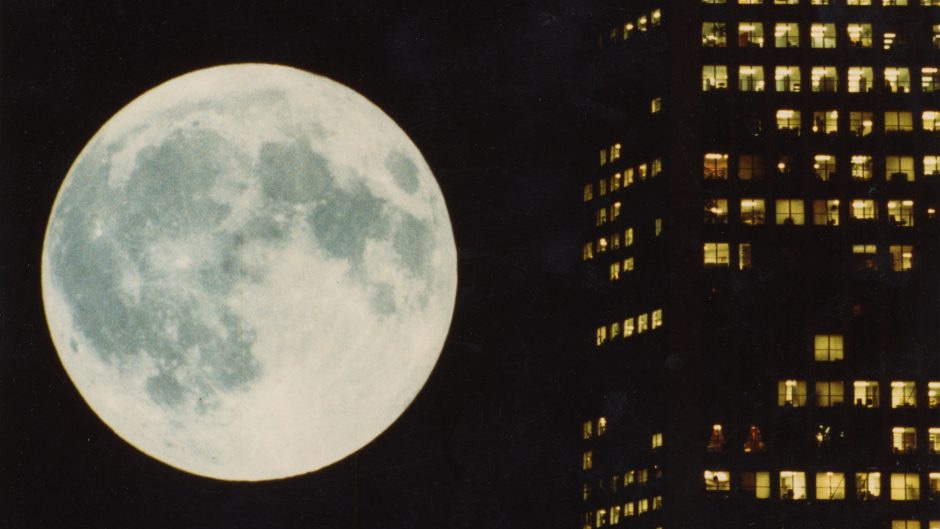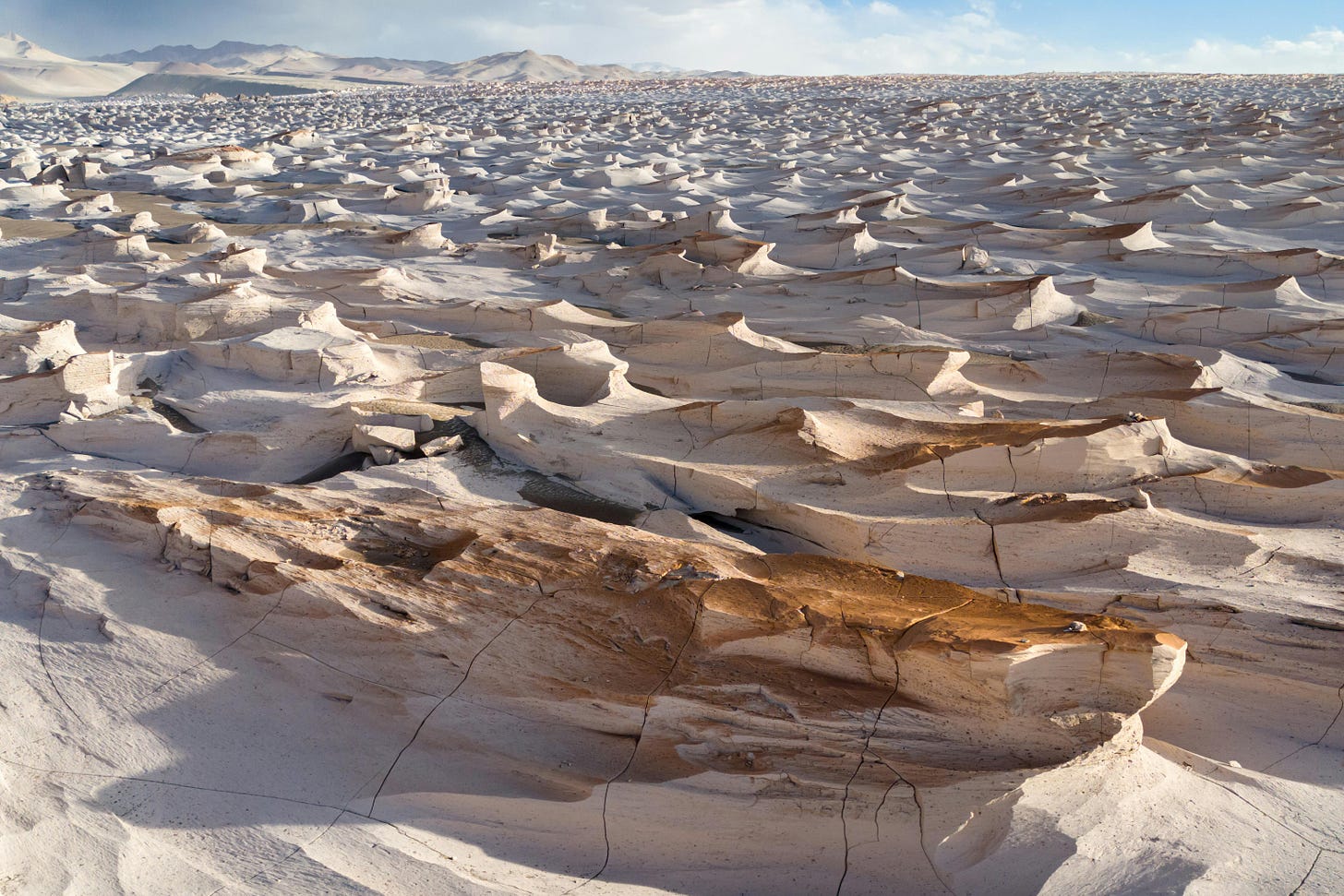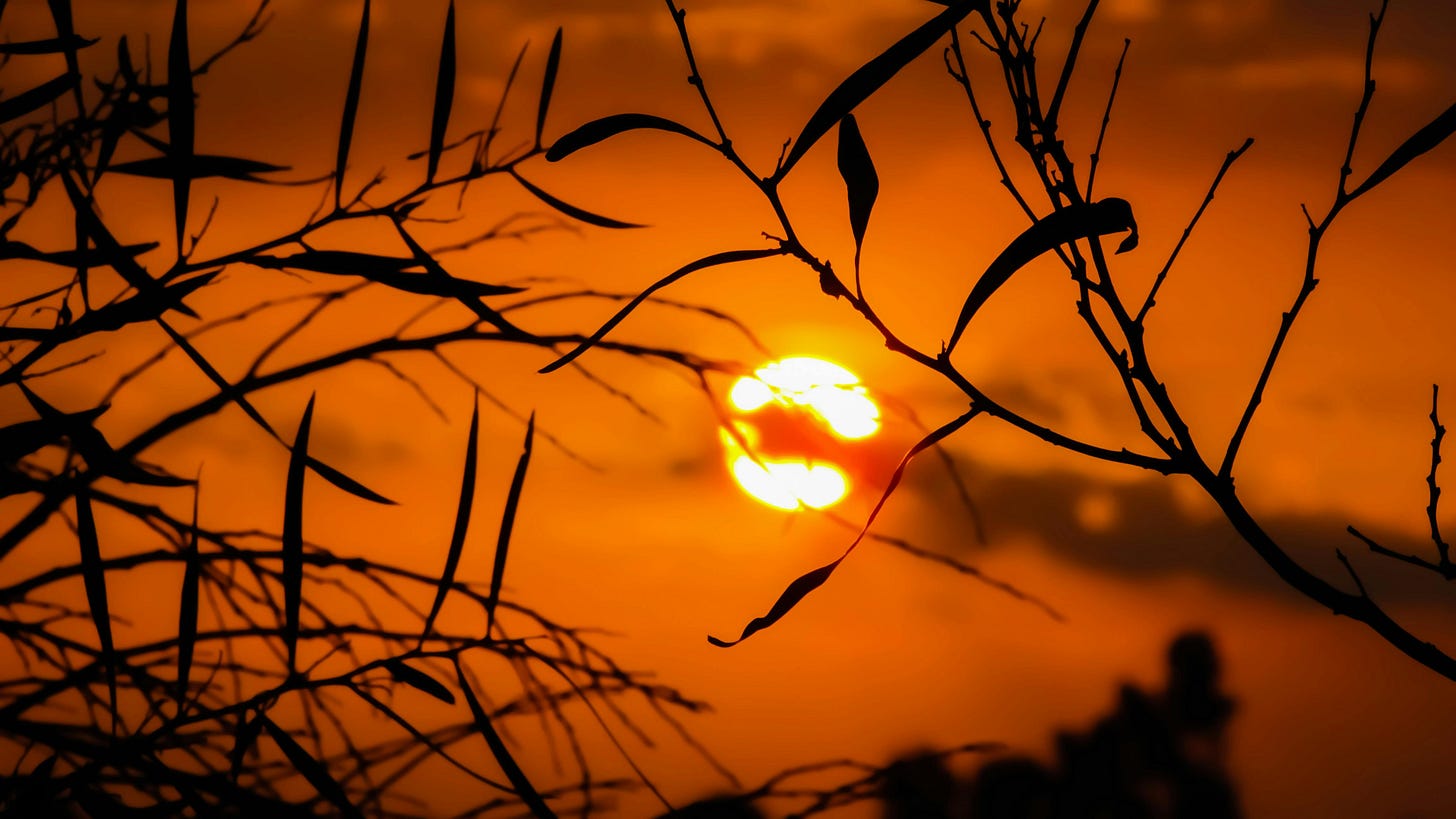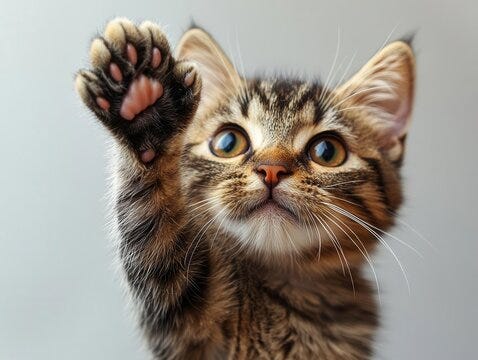Koyaanisqatsi: America Off Balance
All last night, I felt like puking. I opened my mouth and this is what came out.
At some ungodly hour of last night, sick to my stomach and angry that I hadn’t gone to bed in blissful ignorance of the election outcome, I had no words. Today, I have one: Koyaanisqatsi, a Hopi word meaning "life out of balance.” It’s also the name of a 1982 documentary that found me (I did not find it) a few years back.
Koyaanisqatsi is an uncomfortable 90 minute montage set against a score of reverberating, emotional orchestrations by composer Philip Glass. Slow-motion and timelapse footage of natural landscapes give way to scenes of cities, civilization, technology, and destruction. With no words spoken other than a repetition of it’s title, Koyaanisqatsi is an uncomfortable, affronting, powerful statement on the influence of humanity on the natural world and our relationship with that among which we live. Words don’t do it justice. You don’t need to watch the trilogy, though it’s a trip - psychedelics optional. I highly recommend watching at least the trailer before you continue reading.
Koyaanisqatsi director, Godfrey Reggio, found the word from his friend, Hopi elder and healer, David Monongye. As a child, Monongye watched his Hopi village of Oraibi be overtaken by settlers and split in two, exiling those who refused to assimilate; Monongye’s father helped found the Hotvela village to preserve Hopi peoplehood. (Today, Hotevilla-Bacavi is a village on Hopi reservation land in Navajo County, Arizona.) After the US’s use of nuclear weapons against Japan in 1946, Monongye was one of four Hopi elders entrusted to reveal Hopi wisdom, tradition, and prophecy with the general public. Monongye was a sacred spiritual leader, vocal about the harm caused by industrial coal-mining on (still unceded) Hopi land until he passed away at over 100 years old.
Monongye describes koyaanisqatsi as the Hopi perspective of human civilization being out of balance with the land. He told Reggio, “everything [the dominant, imperial culture calls] normal we call a bad normal, everything that [they] call real, we call unreal, everything sane is insane.” The normal baseline for imperialist American culture - social chaos, industry at all costs, climate denial, ignorance of humanity - it damages the people and the land on macro and cellular levels. Reggio’s Koyaanisqatsi forces the viewer to confront the corrupting influence of humanity on the natural world.
The Trumpian construct of a sane America is in fact an insane one. Conversion therapy, erasure of trans and intersex lives, forced pregnancies, normalized assault and rape - to name just a few Republican aspirations - are blatant attacks on autonomy, safety, and humanity. Indigenous cultures across the globe - from Turtle Island to Judea to anywhere else - have thrived in harmony with their land, their climate, their neighbors, while prioritizing justice. A Trump presidency, alongside his hand picked Supreme Court and a Republican-controlled Senate (at the time of writing, House control is still up for grabs), will only dig us deeper into this state of conflict with the land. Trump will, as he already has, conspire and enable other world leaders to shift further out of balance and into turmoil on their lands.
There’s a tragic irony in koyaanisqatsi being the best word I have to describe my feeling today. There’s a glaring parallel to climate change and the ways in which a Trump presidency will push us further and further toward a point of no return. Also glaring, and tragic, is the idea of watching an imperialistic megalomaniac being hailed (read: heiled) returning leader of an imperialistic nation on still unceded land. I’m not suggesting that a Democratic administration would undo all of America’s injustices and shortcomings. Though the dominant narrative associates American history with values of freedom, diversity, and justice - I think koyaanisqatsi was exactly what the founding fathers were going for. America is not who we want her to be, but she’s exactly as she was designed, and she’s showing her true colors. (An aside; why is America a woman? Because at her founding, only men controlled her?)
I am where I am because of America, because of imperialism. My mom’s family came to this country - to my city - having seen the writing on the wall for Jews (“Hebrews”) in 1900s Eastern Europe. (I thank God they did; America later restricted immigration for Jewish refugees.) L. (Louis, we think) Spelke immigrated first and then paid for his family to come over. They settled on land that had been purged of it’s indigenous population in the centuries before. My family aren’t imperialists, and yet we benefited directly from the destruction of another people’s connection with the land. Without imperialism and exploration, our world might not be so interconnected or technologically advanced - and yet, look at the damage done. If it weren’t for the history that preceded me - if America didn’t exist or if those Spelkes had - God forbid - been among relatives murdered in the Holocaust - I wouldn’t be here.
The Talmud tells us that every person is an entire world. My world exists because others were destroyed. I want to say such is the human condition - but I also want to believe there is a future where we don’t have to destroy entire worlds to save the one we all share.
In some ways, the cultural and communal fissures-become-chasm scare me more than four years under another Republican administration. I live in a pretty blue area of a pretty reliably blue state and I can be pretty certain (fingers crossed) that while I might not gain any necessary civil rights before 2028, I probably won’t lose any either. At the same time, I’m still in denial that there’s a very real chance same sex marriage could be illegal by the time I find my beshert. Plenty of blue states like Connecticut and New York (NYC has the largest Jewish population outside of Israel) experienced a red shift since the last election. In 2016, I took solace in the fact that Trump didn’t actually win the popular vote and I directed my anger at the Electoral College. This time around, I can’t even fall back on that. While votes are still being counted and the exact numbers not yet certified, 45 - sorry, 47 - has won the popular vote - and he still would have, at least across non-minority identity categories, even if most third party voters had voted blue. America has spoken. (Don’t worry, the Electoral College is still a piece of crap. At least one thing is consistent.) And since celebrating his Trumpian Triumph, Republicans have already revealed something too many of us knew; that Trump championed Project 2025 all along, and can’t wait to get it underway.
While I organize locally and pray that CT remains a safe-haven for abortion and gender affirming care (at least on a legal level - LGBTQIA+ populations in CT still experience gross healthcare disparities), I’ll look at every community I’ve ever been a part of - queer, Jewish, disability-centered, or otherwise - and wonder who in the room I’m safe with and who would be relieved - or worse, elated - to see me gone from this earth. Virulent antisemitism and philosemitism (antisemitism’s lesser known monozygotic twin) - on the left and right - remind me that my ethnic livelihood is nothing more than a political football game. (This is the only sports analogy I’ll make, I promise.) Meanwhile, I watch too many leaders of the Jewish community - again, on the left and right - all but sleep with the enemy, selling our ethics and cultural foundations down the river for some short time gain and performative allyship.
The last year plus have changed me. Between the events of 10/7, the tragic, dehumanizing war that’s followed, and the ever-passionate and polarizing present political zeitgeist, my schemas of community are fractured and my faith in humanity is shaken. I look at people I respect, even some of who I thought were my partners in activism or my closest friends, and wonder: will they drop me like a hotcake latke when they find out I don’t think Israel should be burned to the ground? And then I look at Jewish spaces where I used to find comfort and wonder: how many people in these spaces are willing to sell down the river every right of their wives, their daughters, their students for what they think will ensure the safety of an institution they think will keep them safe. Newsflash for both of these camps: you’re being manipulated for international political gain and you can’t be kept safe if you’re dead. And if you’re dead - be it by gun violence or lack of access to reproductive and other healthcare, - you can’t fight for those causes you so believe are worth it.
As I doom-scrolled last night, I felt the way I do when I know my mom is right about something but I can’t bear to accept it. (Baruch Hashem, I have no doubts that my mom voted with her conscience.) I know I’m wrong or that my plan has to change, but I choose to sit in denial just a little bit longer while I muster the emotional energy to accept the inevitable.
In my sleepless stupor, I thought, this has to be what Kacey Musgraves sings about in The Architect, climbing up a mountain only for “the wind at your back [to carry] ember and ash and burn your whole house to the ground.”
Kamala Harris’ presidential campaign, in a lot of ways, was a climb up the mountain. I won’t pretend for a moment that I thought she would be a perfect president or lead us with an outstretched arm into a world of peace; hardly so. Still, Kamala Harris embodied a hope and aspiration for this country that for a fleeting moment, felt in reach. She was (is) more qualified than any other candidate and brought her whole self to each moment of the race. Kamala Harris never tried to be anyone other than herself, flaws and shortcomings included. There’s a saying that casting your vote is a chess move, not a love letter. Those of us who voted for Harris/Walz accepted that we were voting for a president imperfect, who might not be our dream candidate, but one who would help us move forward in the long game. That hope feels gone and I, among many others, are singed or worse.
I know that fissure is what the divisive powers want. They want me to see my friend as my enemy so that I isolate, shrink, and suffocate myself until I’m no longer here. And I know that my existence - my queer, intersex, Jewish, disabled joy - is my greatest tool for resistance. And so today, I’ll cradle myself through the stages of grief; through denial, anger, and into reluctant acceptance. Then, I’ll dust myself off, link arms with the communities I still have, and resolve to fight another day.
And yeah, there’s a whole part about how the world loves feminism, but only the Barbie movie kind. A woman can be anything, can’t she? A woman is everything and anything, isn’t she? Only in the movies, and sometimes not even then. Greta Gerwig and America Ferrera can drop a showstopping monologue about the impossible expectations of women and the damage of sexism and it seems like maybe for a little while it made a difference. Compound sexism with the impossible social targets and double standards created by racism, homophobia, transphobia, classism, the list goes on and on; sometimes it feels like the rich white straight man gets off on watching us all flounder…oh, wait.
My very first memory of presidential elections is in the fourth grade. We had a mock election and I voted for Barack Obama, for no reason other than I knew having the first Black president meant a small step toward a more just world. Hannah Montana was the first person to tell me a woman could be president. Now, I’ve gotta be honest, I’m a little less sure.
There’s another Jewish adage, this one from Pirkei Avot 2:16: “It is not your duty to finish the work, but neither are you at liberty to neglect it.” I think most of us knew this country wouldn’t be fixed overnight even if Kamala had won the election - America isn’t some pet being spayed and neutered. (Intersex babies are, though - Republican-backed bills to block gender-affirming care almost always force sex-assignment surgeries on intersex infants.) We were never supposed to finish the work - though sometimes I wish we could - and we certainly didn’t ignore it. We each did what we could, used the strategies we had, and the outcome is what it is. I found comfort, resolve, and maybe even that push I needed toward acceptance (of the result - not the status quo) in Kamala Harris’ concession speech. Harris vowed:
While I concede this election, I do not concede the fight that fueled this campaign—the fight: the fight for freedom, for opportunity, for fairness, and the dignity of all people. A fight for the ideals at the heart of our nation, the ideals that reflect America at our best. That is a fight I will never give up.
And so like a good Cat Lady, I won’t give up either. I’ll continue to wage the fight in quiet ways, and some not-so-quiet ways. I’ll treat others with kindness, look my strangers and neighbors in the eye, and use what strength I have to lift up others. Justice, justice, we shall pursue.
I really thought I’d be jamming out to my girl-power-androgynous-liberation-eat-the-rich-with-the wind-in-my-hair-and-the-spite-in-my-soul playlist this morning. Instead, I leave you caffeine-soaked musings, a little Torah, and a single word encompassing so many of my feelings; koyaanisqatsi.
A high five and a todah rabah to anyone who made it all the way to the bottom of my first official post. Subscribe and/or share if you feel so called.







It’s a dark day for America, but as the Goldberg-Polin’s say “hope is still mandatory.” It’s always darkest before the dawn.